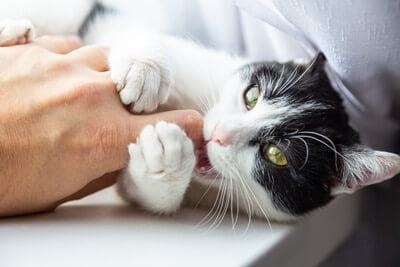Cats never bite without reason. Sometimes their reason is a misunderstanding, anxiety, or an instinct they can’t ignore. However, it’s never ‘just because,’ even if you’re dealing with a kitten. By paying attention to the details, and the times your cat bites, you can figure out the cause.
Most cats randomly bite when seeking attention or feeling scared. It’s most common with kittens, which bite to test their jaw strength and play fight. Older cats that are bored may also bite if you ignore them for too long. If your cat has previous trauma, is scared by new people in the house, or feels threatened by another cat, it may bite as stress relief. Cats that are weaned too early or poorly socialized may bite accidentally without realizing that it’s hurtful.
If your cat bites you and no one else, then it’s likely been scared or mishandled. Cats that are petted too forcefully or in the wrong spots may bite at random. If that’s a regular occurrence, the cat may learn to distrust you and bite out of revenge. No matter the case, you can train this habit out of your cat. Be sure to give it space, verbally reprimand it for biting, reward it for playing nice, and give it toys to keep it busy.
Why Do Cats Bite You For No Reason?
A cat that bites you out of self-defense has a clear reason for its actions. However, sometimes a cat will rush up and nip at you for no reason at all. You didn’t antagonize it, forget to feed it, yell at it, or touch its toys. So, what could it possibly be mad about?
Even in these cases, the cat is biting you for specific reasons. Cats don’t bite at random, and signs of aggression are never out of the blue. If they seem to be, that’s only because you’ve overlooked the real purpose of that abruptly mean behavior.
By uncovering the strange purpose of these bites, you can help your pet calm down and avoid bites in the future. To do that, you need to consider:
- The cat’s environment: Is it too hot or cold? Are there objects or people that are scaring it?
- What the cat was doing before it bit you: Was it trying to get your attention or play-fighting with another cat?
- How the cat acted in the last few days: Has it acted sick, aggressive, or otherwise upset?
- If the cat is well-fed: Is the cat eating enough, and is the food it’s getting properly balanced?
- If the cat just came in from the outdoors: Did it get caught in the rain, get into a fight, or get lost? When it’s stressed, it’ll be more prone to biting.
- How old the cat is: Kittens are more prone to biting than any other type of cat.
- How other pets or roommates treat the cat: If the cat is mistreated elsewhere in the household or feels annoyed by other members, it may lash out at you.
If one of these factors is off, the cat will be more prone to biting. It’s not ‘just because.’ It’s your cat reacting to stress, trying to send you a message, or just acting its age.
Why Does My Cat Randomly Bite Me?
Perhaps your cat bites without any warning. It may be perfectly loveable and content one moment, then reach over and nip at you the next. It may do this morning, noon, and night, before or after meals, or at other seemingly random times. You can rest assured it’s not actually random. Instead, it’s because:
You Have A Kitten
Kittens are the most prone to biting at random times and for seemingly no reason. That’s because they’re:
- Still young
- Growing in their adult teeth
- Learning how to control their biting strength
- Developing their instincts through play-fighting
As they mature, cats will mellow out and lose these urges. In the meantime, you have to deal with a very bitey little pet.
New Teeth
The kitten doesn’t mean any harm when it bites since it doesn’t understand that this is bad behavior. A kitten’s milk teeth may be falling out and getting replaced with adult teeth. This can be painful, requiring the baby cat to teethe as a form of relief.
Likewise, its teeth might be new, and it will be eager to test them on any available surface. With enough training, though, kittens can easily learn not to chomp your fingers (or other parts of your body) during playtime.
Gets Carried Away
Kittens easily get carried away during playtime. They have a lot of energy to spend, and they need to spend it. When doing so, kittens can get too excited and exhibit play aggression. Your kitten doesn’t really want to be aggressive; it just doesn’t know when to stop during a wrestling session.
Poorly Socialized
Play aggression is more likely to happen if a cat is raised alone, especially if it’s weaned too early. It may also happen if the kitten had no playmates before being separated from its mother.
Cats learn how to gauge their behavior and strength from their litter-mates and mother. If your kitten lacked a proper example, it might even grow up to bite at random as an adult.
Your Cat Needs To Spend Energy
Although kittens bite as a way to stay active, older cats fall victim to this as well. When it’s bored, lacks enrichment, or feels ignored, a mature cat will turn to biting. This is an obvious sign that your cat needs more playtime with you.
It’s more prominent in cats that are kept as the only pet in the home. However, it can also manifest in cats that have destroyed all their toys or are bored with the same old collection.
Despite its age, the solution is the same as for biting kittens. Make sure that your cat is getting ample attention. Play with it once a day, and provide it with extra toys to round out its daily routine. If that doesn’t solve the problem, you can reprimand the cat for biting and reward it for playing nice.

You’re Petting Your Cat Wrong
You may be accidentally hurting the cat. Petting too hard is one of the most common reasons why a cat suddenly bites. It may be that your cat is:
- Hurt and asking you to stop. The cat may have an existing injury, or you may be petting with too much force.
- Overstimulated: The cat may get too excited and transition into play-fighting. Biting is the opening move.
Over-petting is an easy mistake for people who’ve only kept dogs in the past. Although a puppy will love endless scratches and forceful petting, a cat has a much lower tolerance. Your cat may need to be handled more gently or only want to be petted for a short amount of time.
On the other hand, cats may react aggressively if you pet sensitive areas. It may trigger their defensive instincts, as other cats will target these areas to win a fight. It may also be uncomfortable for the cat. Be sure to avoid the base of the tail, the underbelly, and the underside of joints. This is especially important for cats that are unfamiliar with you. Instead, only pet safe areas, such as the:
- Head
- Chin
- Back of the neck
- Ears
Some have no preferences whatsoever, but if your feline is suddenly biting, it clearly does. Look out for other signs of discomfort and overstimulation. These can help you stop early before teeth get involved:
- A wagging or thumping tail
- Ears going flat against the head
- Puffed-up fur
- Turning its head toward your hand
Cat Is Declawed
Cats that are declawed are more likely to bite. That’s because felines rely on both their claws and their teeth as:
- Natural defenses
- Ways to climb and maintain their balance
If the cat is deprived of its nails, it will use its teeth first and foremost. This may include biting you when it’s:
- Trying to catch its balance
- Upset and wants you to know it
- Feeling frustrated about stretching its paws or using its claws
Your cat may be prone to biting as a way to show its discomfort or to deal with pain. If it’s constantly limping, it may feel at risk of losing its balance. This will make it rely heavily on the last method of gripping that it has: teeth.
Cat Feels Threatened
A cat that feels threatened is likely to lash out by biting and scratching. If this danger is long-term and ever-present, the cat may appear to lash out at random times. After all, it’s trying to stay calm and lay low until it can’t. Possible threats for a cat include:
- A new addition to the home: This can be another pet, a new baby, or even a new roommate.
- A trespasser: Your cat may be able to smell a feral cat traipsing around outside. This will make your feline more aggressive as it tries to defend its space.
- Trauma: Cats adopted from abusive or neglectful homes are likely to see threats anywhere they look. This can lead to your anxious cat biting at random, thanks to randomly perceived threats.
Needs Not Being Met
Cats don’t have many ways to complain. If they feel the meowing, pacing, and destructive behavior (such as knocking items off tables) haven’t gained your attention, they may bite. Your feline could be trying to explain that its:
- Food is empty or tastes bad
- Water is too close to its food bowl
- Litter box is dirty
- Lonely or bored
- Favorite toy needs replaced
If these needs aren’t being met, the cat can grow increasingly frustrated. Once it’s had enough, it may bite to gain your attention. This will seem random at first. However, if you look closely, you might see the cat only bites you when you’re near a problem area. This could be a sign that you need to intervene there.
Your Own Emotions
Cats may seem aloof and uncaring, but they’re actually very in tune with our emotions. After all, cats are mesopredators. Figuring out the emotions of animals around them is a great tool for survival. For example, if fellow cats are anxious, this can be a sign of danger. Your cat will pick up on your emotions and react accordingly.
In fact, Animal Cognition determined that cats not only read their owners’ emotions. They also mimic them. If you appear excited and pleased, the cat is likely to adopt a brighter mood. If you’re angry or frustrated, the cat may nip at you to showcase its own displeasure.
As such, when your cat bites you at random, consider how you were acting beforehand. If you reprimanded it, stomped around the house, or acted upset, the cat may be responding in kind.
Why Does My Cat Randomly Come Up And Bite Me?
In some cases, a feline will bypass all other members of the household to bite you. It may even march up from a different part of the home, plop down in your lap, and nip. These more defined bites have clear reasons that you can suss out:
Mishandling Your Cat
Cats are fast learners. If you’ve always pet your cat too forcefully, the animal will come to expect that you always will. This can make the feline resent you and try avoiding your reach. If you push the matter, the cat might start biting whenever it sees you. This can deteriorate your relationship in short order, and it’s hard to regain a cat’s trust.
If you’re sitting down to pet a different animal, the cat may even be jealous. This will cause it to march up and bite you. It wishes that you would pet it correctly, and it’s angry that you’re instead giving that attention to another animal.
To solve this, give your cat space. Offer it treats and soft-spoken encouragement whenever it’s near. It will eventually warm up to you. When it does, make sure to pet it gently and only on areas that it allows.
Need To Spend Energy
A kitten that marches up to bite you is trying to initiate playtime. It may even see your foot, hand, or ankle as a toy. If you twitch one of these body parts or move interestingly, the cat might get confused. It thinks you’re trying to play, and it responds in kind.
To avoid this, make sure that you give enough attention to your kitten. About 15 minutes a day is required, but the more you can play, the better. This will keep your pet well-socialized, entertained, and closely bonded with you. For times where you can’t play, be sure to offer:
- Toys
- Scratching posts
- Cat towers

Cat Is Scared Of You
Some cats have deep-seated trauma from previous owners. Other cats are just anxious and can be easily spooked. No matter the case, your cat may bite whenever it feels afraid of you or something in its environment. This is a natural response that’s designed to scare off the threat. If the cat targets you in particular, then it may:
- Think that you resemble a previous owner
- Dislike a perfume or article of clothing that you wear
- Be scared by your voice’s tone or volume
The cat may also bite whatever is nearby, and since it trusts you, it spends the most time in your lap. A crack of thunder, for example, may confuse the cat and make it bite the nearest object out of fear, which happens to be your hand.
Why Does My Cat Bite Me And Run Away?
Certain bites mean certain things. If your cat bites you, then immediately runs away, then it’s trying to play. It wants attention and expects you to chase it.
In a litter, cats often engage each other in this way. It’s a taunting gesture that always gets a reaction. If you don’t react, the cat will try this tactic again and again.
You can discourage your cat from this behavior with training. Give it a stern ‘no,’ and try playing with it more often throughout the day. One or two 15-minute sessions could be all it takes.
Why Does My Cat Bite Me Hard?
Shallow, quick bites are usually due to a lack of attention or overstimulation. Bites that feel deliberate are another issue entirely. A cat that bites hard usually does so out of self-defense. The cat likely feels scared, threatened, or provoked. Loud noises, aggressive petting, or being held wrongly are the usual culprits.
On the other hand, hard bites sometimes come from bad habits. Your cat may have been weaned early, so it never learned how to gauge its bites. Instead, it puts full force into each one. If this is the case, you will need to train the cat to avoid biting at all costs.
While it may be concerning at first, it’s normal for a cat to bite on occasion. Learning how your cat communicates and training it can help you prevent bites in the future.


Love this page! I have a Cat I took in about a month ago. I think he is maybe 6 months. Bites my Husband for no reason. It is really weird because cats love him he is very chill. I am always moving around and a little high strung. for some reason this cat loves me.
He also stalks my dog which is really weird because he is a great Dane.
What can I do?